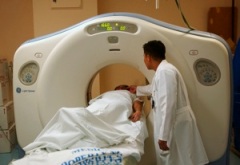Adults at high risk of developing lung cancer – especially smokers – should have low-dose CT scans annually, according to new recommendations by the US Preventive Services Task Force. The panel determined that yearly scans “can prevent a substantial number of lung cancer-related deaths,” according to a press release issued today. Adults at high risk of developing lung cancer – especially smokers – should have low-dose CT scans annually, according to new recommendations by the US Preventive Services Task Force. The panel determined that yearly scans “can prevent a substantial number of lung cancer-related deaths,” according to a press release issued today. Smoking causes some 75 percent of lung cancers. The longer people smoke, the greater the risk of developing lung cancer over time. Most lung cancer occurs in people 55 and older. 
 After reviewing current data and clinical evidence, the panel determined that anyone with a 30 pack year habit, age 55 to 80, who currently smokes or who has quit within the last 15 years, will benefit from the additional scans. A “30 pack year” is the equivalent of smoking one pack a day for 30 years or two packs per day for 15 years. “Lung cancer is the leading cause of cancer death in the United States and a devastating diagnosis for more than two hundred thousand people each year,” said Task Force chair Virginia Moyer, M.D., M.P.H. These recommendations support the results of a recent collaborative review of low dose CT screening by the American Society of Clinical Oncology, the American Cancer Society (ACS), the American College of Chest Physicians (ACCP), and the National Comprehensive Cancer Network (NCCN)as part of clinical practice guidelines. Nearly 90 percent of people who develop lung cancer die from the disease, in part because it often is not found until it is at an advanced stage. “By screening those at high risk, we can find lung cancer at earlier stages when it is more likely to be treatable,” Moyer said. Recommendations made by the USPSTF, an independent, volunteer panel of experts in preventive care and evidence-based medicine are not mandates; however they form the basis of clinical standards for many professional societies, health organizations, and medical quality review groups.
After reviewing current data and clinical evidence, the panel determined that anyone with a 30 pack year habit, age 55 to 80, who currently smokes or who has quit within the last 15 years, will benefit from the additional scans. A “30 pack year” is the equivalent of smoking one pack a day for 30 years or two packs per day for 15 years. “Lung cancer is the leading cause of cancer death in the United States and a devastating diagnosis for more than two hundred thousand people each year,” said Task Force chair Virginia Moyer, M.D., M.P.H. These recommendations support the results of a recent collaborative review of low dose CT screening by the American Society of Clinical Oncology, the American Cancer Society (ACS), the American College of Chest Physicians (ACCP), and the National Comprehensive Cancer Network (NCCN)as part of clinical practice guidelines. Nearly 90 percent of people who develop lung cancer die from the disease, in part because it often is not found until it is at an advanced stage. “By screening those at high risk, we can find lung cancer at earlier stages when it is more likely to be treatable,” Moyer said. Recommendations made by the USPSTF, an independent, volunteer panel of experts in preventive care and evidence-based medicine are not mandates; however they form the basis of clinical standards for many professional societies, health organizations, and medical quality review groups.

